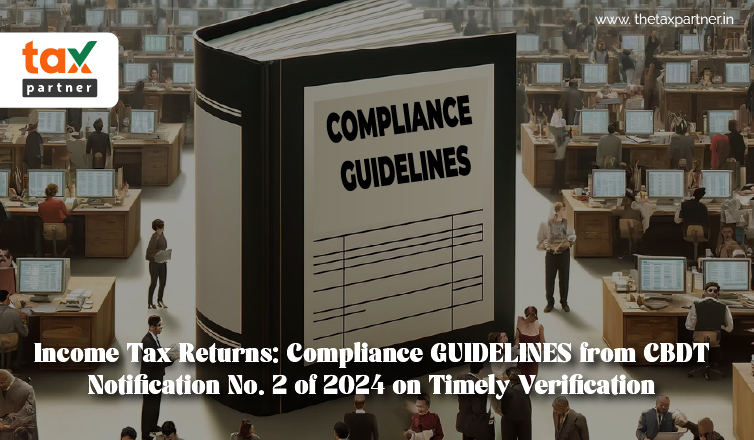Income Tax Returns: Compliance Guidelines
Income Tax Returns: Compliance Guidelines from CBDT Notification No. 2 of 2024 on Timely Verification
Author-Tanvi Thapliyal
There's been a new notification, Notification No. 2 of 2024, from the Central Board of Direct Taxes (CBDT). It's an important update that deals with the time limit for verifying Income Tax Returns (ITRs) after they've been uploaded. We are here to provide you with some important information about what happens if you verify your tax return late, as well as the steps you need to follow to submit your ITR-V. It's really important for taxpayers to understand the implications of this notification. This will help them make sure they follow the tax regulations and avoid any penalties for filing their taxes late. This notification helps taxpayers by giving them clear guidelines on when and how to verify their information for filing income taxes. It empowers them to navigate the process more effectively. Moreover, it helps to make interactions with the tax authorities more seamless and contributes to an overall more efficient tax administration system. This article will be helpful for taxpayers, tax professionals, and others involved in the income tax filing process. It will provide information on verification procedures and timelines, helping them understand and follow the required steps.
Rule 14 of the Centralised Processing of Returns Scheme
Rule 14 of the Centralised Processing of Returns Scheme, 2011 plays a crucial role in overseeing the verification process for electronically submitted Income Tax Returns (ITRs). Here is a detailed overview of the key provisions:
-
The time limit for verification is specified in Rule 14. Taxpayers are required to verify their electronically submitted ITRs within this duration. The time limit is important because it ensures that you comply with tax regulations on time and helps you avoid penalties for verifying your taxes late.
-
The modes of verification refer to the different methods that taxpayers can use to electronically verify their ITRs, as outlined in the rule. Some of the methods that may be available include electronic verification through Aadhaar OTP, using net banking, or submitting the ITR-V form (acknowledgment) to the designated address.
-
The consequences of not verifying an uploaded ITR within the specified time frame are likely outlined in Rule 14. If you don't file your return on time, there could be some consequences. These consequences might include considering your return as invalid or imposing penalties on you under the provisions of the Income-tax Act, 1961.
-
The prescribed procedures refer to the specific steps and documentation needed to verify an Individual Tax Return (ITR) electronically. Here are some possible topics that could be included: how to generate and submit an electronic verification code (EVC), or the process for sending the ITR-V form to the Centralised Processing Centre.
Basically, Rule 14 is the set of laws that governs how the verification process works for electronically filed Income Tax Returns (ITRs) under the Centralised Processing of Returns Scheme. Notifications issued by the Central Board of Direct Taxes (CBDT), like Notification No. 2 of 2024, are often released to complement or clarify the provisions mentioned in Rule 14. These notifications aim to make it easier for taxpayers to understand and follow the rules, ensuring smooth implementation and compliance. To ensure that your income tax returns are processed smoothly and to avoid any penalties or complications, it is important for taxpayers to understand and follow the regulations outlined in Rule 14.
Significance of verifying their Income Tax Returns (ITRs)
It is important for taxpayers to understand the significance of verifying their Income Tax Returns (ITRs) in a timely manner, as explained in Notification No. 2 of 2024 regarding the verification time limit. Following is the clarification:
-
Verification must be completed within 30 days.
-
When the taxpayer uploads their income tax return and either electronically verifies it or submits the ITR-V form within 30 days from the date of uploading, the system considers the date of uploading as the date when the return was officially submitted.
-
So, if you finish the verification process within the first 30 days, the date you upload the file will be used to decide if your return was filed on time.
-
Verification that occurs after 30 days:
-
But if the verification process takes longer than 30 days and you submit the verification after this time, the date of submitting the verification will be considered as the date when you filed the return.
-
If the taxpayer doesn't verify the return within 30 days, they will face the consequences of late filing. In this case, the date of verification submission will be considered as the date when the return was furnished.
-
The consequences of filing your documents late are:
-
If you file your return late, you may face penalties or other consequences as outlined in the Income-tax Act, 1961.
-
It's important for taxpayers to remember to complete the verification process within the given timeframe to avoid penalties and make sure they are following tax regulations.
To summarise, the notification emphasises the importance of verifying tax returns promptly to avoid the consequences of filing them late. It is important for taxpayers to complete the verification process as soon as possible. This can be done either through electronic verification or by submitting the ITR-V form within 30 days. This helps ensure compliance with tax laws and avoids any penalties or complications.
Process for submitting the ITR-V form
The process for submitting the ITR-V form, as mentioned in Notification No. 2 of 2024, highlights the significance of sending the verified form to the Centralised Processing Centre (CPC) in Bengaluru.
The process for submitting the prescribed ITR-V is as follows:
-
After you upload and verify your Income Tax Return (ITR) within the given time frame, you need to send the verified ITR-V form to the Centralised Processing Centre (CPC) in Bengaluru.
-
You can submit the ITR-V form by using either ordinary or speed post, as mentioned in the notification.
-
The date when the ITR-V form is received at the CPC is very important. This is used to determine the 30-day period starting from the date when the income return is uploaded.
So, it's important for taxpayers to make sure they send the verified ITR-V form to the CPC promptly. This will help avoid any delays in the processing of their returns and ensure they comply with the prescribed timelines.To ensure that your income tax returns are processed efficiently and to avoid penalties or consequences for late filing or non-compliance, it is important to follow the ITR-V submission process described in Notification No. 2 of 2024.
consequences for late filing
The importance of timely verification in ensuring the validity of filed returns is emphasised in Notification No. 2 of 2024, which outlines the consequences of late verification.
-
The consequences of not verifying the return on time are that it will be considered invalid.
-
If taxpayers don't complete the verification process on time, their filed returns will be considered invalid.
-
Due to this, it is possible that these returns will not be processed and any benefits or deductions mentioned in them may not be taken into account by the tax authorities.
-
The importance of verifying returns promptly after filing is highlighted by this notification. This is to prevent any complications that may arise.
-
Verifying the filed returns in a timely manner is important to ensure their validity and smooth processing, without any delays or issues.
-
So, it's really important for taxpayers to complete the verification process quickly to avoid their returns being invalidated and any negative consequences that may come with it.
Notification No. 2 of 2024 emphasises the importance of verifying tax returns on time to ensure their validity. It is recommended that taxpayers verify their returns online as soon as they file them to avoid any issues and make sure they are following tax regulations.
Applicability and Effective Date
It's important for taxpayers to understand the applicability and effective date mentioned in Notification No. 2 of 2024.
-
The notification is applicable to returns that are uploaded or submitted on the e-filing portal.
-
So basically, the rules and regulations mentioned in the notification only apply to people who file their returns electronically using the designated e-filing platform.
-
The effective date for Notification No. 2 of 2024 is April 1, 2024. So, what this means is that the rules mentioned in the notification will be applicable to all returns that are filed on or after this particular date.
-
Make sure you follow the verification process for tax returns filed on or after April 1, 2024, to avoid any penalties or complications that can come from not following the rules.
The importance of the specified effective date is that it allows taxpayers to be informed about the regulations and follow them for any returns filed on or after April 1, 2024. To make sure you follow the correct verification process mentioned in the notification, taxpayers can ensure they are complying with tax laws and regulations. This will help their returns get processed smoothly and avoid any penalties or consequences.
Conclusion
Overall, Notification No. 2 of 2024 is an important directive for taxpayers. It provides essential guidelines for verifying Income Tax Returns (ITRs). The notification highlights the importance of following the prescribed procedures and submitting tax returns on time to ensure that they are valid. It is important for taxpayers to quickly complete e-verification or submit the ITR-V form within 30 days to avoid negative consequences of filing late.
To make the income tax filing process smoother and more efficient, taxpayers should understand and follow the provisions outlined in the notification. Verifying your information in a timely manner is important because it helps you comply with tax regulations and makes it easier for your tax returns to be processed quickly. This reduces the chances of facing penalties or complications.
Basically, Notification No. 2 of 2024 highlights the significance of taxpayers being proactive and compliant. This will ultimately result in a smoother and easier tax filing process for everyone involved.
TaxPartner can assist taxpayers by providing expert guidance, ensuring compliance, sending timely reminders, and resolving any issues encountered during the verification process. With TaxPartner's support, taxpayers can navigate the process efficiently and contribute to a smooth income tax filing experience.
FAQs
What is CBDT Notification No. 2 of 2024 about?
CBDT Notification No. 2 of 2024 provides guidelines on the time limit for verifying Income Tax Returns (ITRs) after uploading.
Who is affected by this notification?
This notification applies to all taxpayers who file their Income Tax Returns electronically.
What is the time limit for verifying ITRs as per the notification?
Taxpayers must verify their ITRs within 30 days from the date of uploading or by the due date for filing the return, whichever is later.
What happens if I fail to verify my ITR within the specified time limit?
Failure to verify the ITR within the specified time renders it invalid.
How can I verify my ITR within the stipulated time frame?
You can verify your ITR by either e-verification or submitting the ITR-V form to the designated address.
Can I e-verify my ITR?
Yes, taxpayers can e-verify their ITR using methods such as Aadhaar OTP, net banking, or electronic verification code (EVC).
What is ITR-V?
ITR-V is the acknowledgment form generated upon filing the return, which needs to be physically signed and submitted if e-verification is not done.
Where should I send the ITR-V form for submission?
The ITR-V form must be sent to the Centralised Processing Centre (CPC) in Bengaluru via ordinary or speed post.
What is the significance of the effective date mentioned in the notification?
The effective date ensures that the guidelines specified in the notification apply to returns filed on or after that date.
Does the notification apply to returns filed manually?
No, the notification applies only to returns filed electronically through the e-filing portal.
Can I seek an extension for verifying my ITR?
No, the time limit for verification specified in the notification cannot be extended.
What are the consequences of late verification?
Late verification results in the invalidation of the filed return, potentially leading to penalties or other complications.
How can I ensure compliance with the notification?
Ensure timely verification of your ITR within the stipulated 30-day period and follow the prescribed procedures outlined in the notification.
Where can I find more information about the notification?
You can refer to the official CBDT website or consult with tax professionals for further clarification and assistance regarding the notification.



